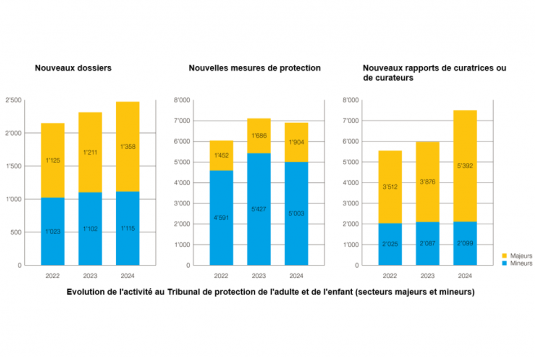Meeting real needs
An increase in the number of cases and measures
The number of adult protection cases in the canton has risen steadily over the past 10 years (+72% between 2011 and 2021). In the same way, the main protection measures have been steadily increasing, in particular representative deputyships and placements for assistance purposes.
The introduction of the new law in 2013, the aim of which was to reduce the number and scope of new measures, was ultimately accompanied by the population's growing need for protection (particularly that of the ageing ‘baby boom’ generation, which now accounts for more than a third of the adult cases handled by the court).
Making adjustments to the protection system should ensure a better match between the resources deployed by the canton and the needs of the people concerned.
Report on the activities of the Judicial power in 2023
A reform to rethink adult protection: why?

Management of agents
Launched in February 2021, The Agent management program RePAir (GMR) aims to improve the management and support of agents appointed by the Tribunal de protection de l'adulte et de l'enfant (TPAE) and to define the main principles applicable to the administration of mandates entrusted mainly to deputies and estate administrators (appointed by the Justice of the Peace).
As a reminder, the Tribunal de protection de l'adulte et de l'enfant oversees the protection of people throughout their lives, from childhood to adulthood to succession (Justice of the Peace). It intervenes when no satisfactory solution for the person concerned (PCo) has been found within the family, with relatives or any other institution that can provide help. Protective measures are designed to protect any person who is no longer able to safeguard his or her own interests and for whom the support provided by relatives or services (public and private) is insufficient.
As part of the Agent Management program, working groups, made of TPAE staff and magistrates as well as representatives of the partners (private or institutional agents, namely the OPAd and the SPMi), are responsible for implementing various projects in synergy with the RePAir program.
The GMR program consists of the following projects:
-
Main principles – Define the rules and main principles applicable to the administration of mandates: recruitment, appointment, tasks of the person in charge of the mandate and succession; development of tools to optimize the implementation of mandates.
-
Agents’ register – Set up a register containing all relevant information on all private professional agents, to facilitate identification of the agent best suited to the needs and specific situation of the individual concerned.
-
Steering the measure and monitoring the situation of the protected person. Review supervisory rules and establish a new model for monitoring the activities of the agents in Geneva
-
Simplification of data exchange with the Office for Adult Protection (OPAd) and the Minors' protection Service (SPMi) - Improve the efficiency of data and document exchanges in the context of mandates entrusted by the TPAE to certain partners, in particular the OPAd, by digitizing documents and business processes. Interfaces between the new system and those of the partners will be put in place to facilitate the exchange of information and digitized documents.
Progress report
A new register of agents is being set up within the TPAE.
It centralizes the information needed to identify the agent best suited to the specific needs of the concerned litigant, while at the same time providing better visibility of all the mandates in progress at the TPAE. Ultimately, it will provide a tool to meet the needs associated with managing mandates and monitoring the court's activity.
New work processes and a review of tools and forms for agents
The documentation developed within this framework (forms, report templates, procedures, etc.) is gradually being made available on the page dedicated to deputies. The initial focus will be on the format of the various reports and accounts.
RePAir: Rethinking adult protection for the future
In January 2023, the Department of Social Cohesion (DCS) and the Judicial power launched an ambitious program called Rethinking Adult Protection for the Future (RePAir) to better help and support the most vulnerable adults in the canton of Geneva.
Jointly managed by the Department of Social Cohesion (DCS) and the Judicial power, RePAir program aims to improve administrative, legal, social, medical and financial protection for the most vulnerable people, until they regain their autonomy (where possible) and with due respect for their right to self-determination.
The aim of the program is to rethink the canton's adult protection system in order to provide better support and assistance to vulnerable people who are no longer in a position to safeguard their interests themselves, when the support provided by their relatives or by private or public services becomes insufficient.
The objectives
- To strengthen the application of the principles of proportionality and subsidiarity* of the adult protection measure.
- To improve the quality of support for people subject to an adult protection measure
- To reduce the risk of a return under an adult protection measure after a previous measure has been lifted.
This is a cross-disciplinary program covering a wide area, which requires a great deal of coordination, not only with all the partners but also with other ongoing projects.
* Principle according to which the protection authority may only take protective measures if the assistance required by the person concerned cannot be provided by his or her family, close relations or the competent public or private services.
Progress report
Sharing views on adult protection
After an initial phase of consultation with stakeholders to define the objectives and scope of the reform, the Judicial power and the Department of Social Cohesion set about producing detailed analyses of issues relating to the protection of adults.
These analyses include a survey of people affected by protection measures and partners in the social and healthcare network. They include both demographic projections and inter-cantonal comparisons of data trends. Lastly, these analyses consider various aspects of the current situation in terms of available resources, the legal frameworks in force in the field, and survey, support and training mechanisms.
These different analyses help to build a solid base of knowledge that can be used to develop innovative solutions, in consultation with stakeholders that put the concerned people at the centre.
Reinforcement of the application of the principles of subsidiarity and proportionality of the measure
An information strategy on adult protection measures is currently being developed. The aim is twofold: firstly, to provide effective, coherent and coordinated information on all measures and, secondly, to encourage the use of advance personal measures (mandates for incapacity and advance instructions) by the population of Geneva. The deployment of such strategies will undoubtedly help to strengthen the right to self-determination and the de-stigmatization of this issue.
In accordance with the draft revision of the Civil Code section relating to adult protection, work is also underway to identify a body with which to register mandates for incapacity and, possibly, anticipated directives.
At the same time, as part of a pilot project with the Pro Senectute Foundation, the Department of Social Cohesion and the Judicial power are testing the deployment of a social investigation system. This will help to strengthen the implementation of the principles of subsidiarity and proportionality.
Improving the quality of support for people under adult protection measures
To provide better support for people under deputyship, the Department of Social Cohesion and the Judicial power are working to broaden the range of deputies, in particular by entrusting mandates to the Pro Senectute Foundation as part of a pilot project. More broadly, the aim is to examine the revised criteria for awarding mandates and remunerating deputies.
Questions/answers
The programme RePAir (Rethinking Adult Protection for the Future) was launched in January 2023 by the Judicial power and the Département de la cohésion sociale et de la solidarité.
It pursues three main objectives:
- Reinforcing the application of the principles of proportionality and subsidiarity* of the measure
- Improving the quality of support for people subject to adult protection measures
- Reducing the risk of people being placed under adult protection once a measure has been lifted
* Principle according to which the protection authority may only take protective measures if the assistance required by the person concerned cannot be provided by his or her family, close relatives or the competent public or private services.
To better protect the most vulnerable people: the ever-increasing needs of a part of the population, namely the elderly and young adults, have led to an increase in the number of reports to the Tribunal de protection de l’adulte et de l’enfant, particularly since the pandemic of COVID-19.
Two effects have been observed. Firstly, there has been an increase in the number of people concerned, but above all an increase in the needs of each of them. And secondly, the observation that the situations have become increasingly complex.
This has led to an increase in the number of measures ordered by the TPAE and entrusted to the OPAd or to private deputies, which are ordered only after the situation has been investigated and if they are necessary.
By taking action on three levels,
- Before a measure is ordered by the protection authority (the TPAE)
- During provision of care to a person subject to a protective measure
- Subsequently to the measure
The current reform will help to improve support for vulnerable people throughout their lives by:
- improving the information available on the accessible resources in the field of social action and on adult protection measures
- deploying an innovative support system for people concerned by a report before any adult protection measures are taken:
- reviewing the criteria for awarding and remunerating mandates, as well as the training, guidance and support provided to deputies
Ultimately, the aim is to provide better protection for the most vulnerable.
* Principle according to which the protection authority may only take protective measures if the assistance required by the person concerned cannot be provided by his or her family, close relatives or the competent public or private services.
The Agent Management program will ultimately benefit three main groups:
- The people concerned: to better meet the needs of people placed under protective measures, the aim of the Agent Management program is to improve the match between the designated agent and the needs and situation of the person concerned.
- Agents: clear information available on the Internet, simplified contacts with the court.
- The court: clarification and optimization of internal processes for the benefit of those concerned, agents and TPAE staff.
Around one in four deputies is a relative. The Agent Management program RePAir (GMR) aims to take a heterogeneous look at the allocation of curatorship mandates.
To better take into account the needs of all parties and ensure the relevance of the program's results, the Judicial power has involved a panel of representatives.



